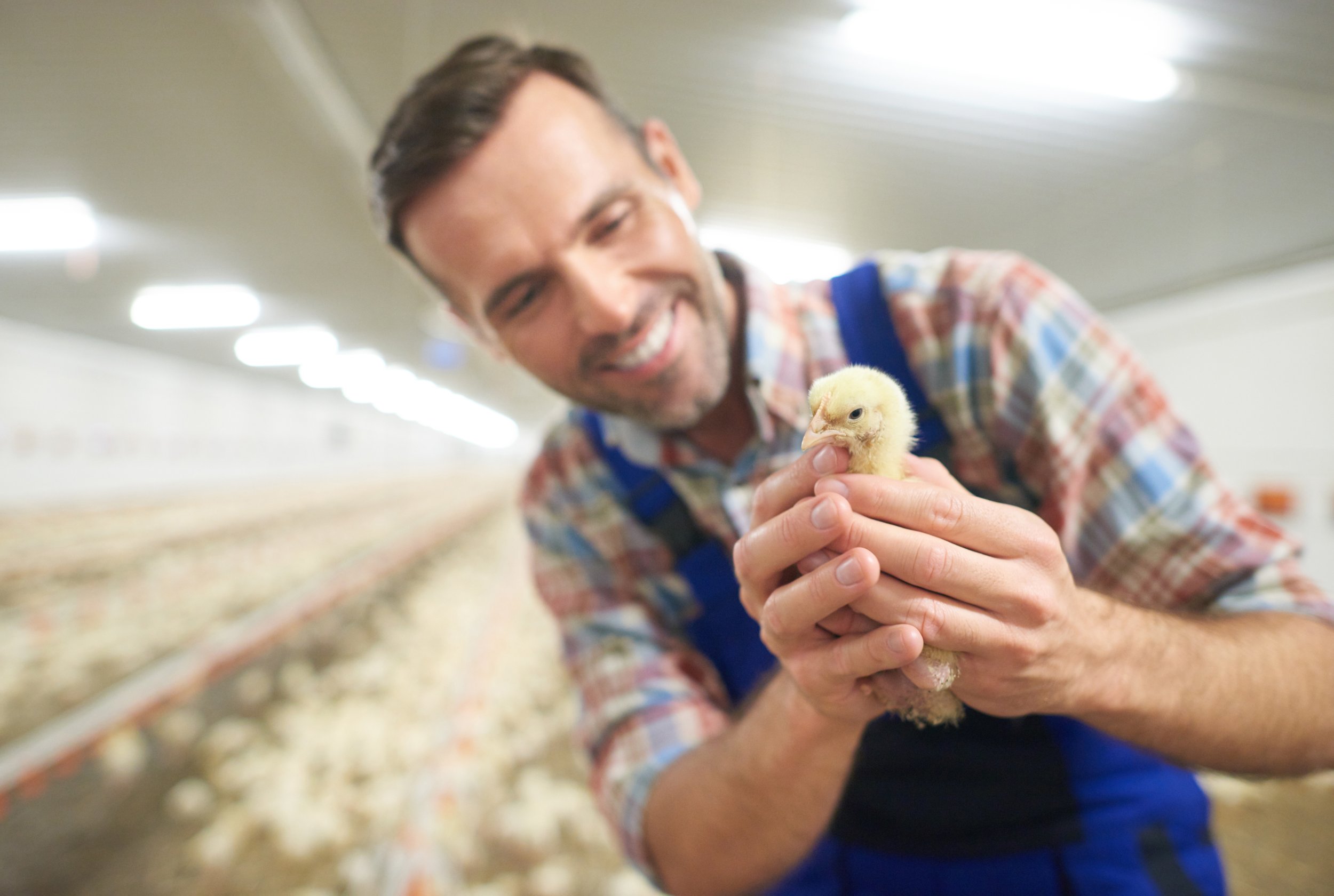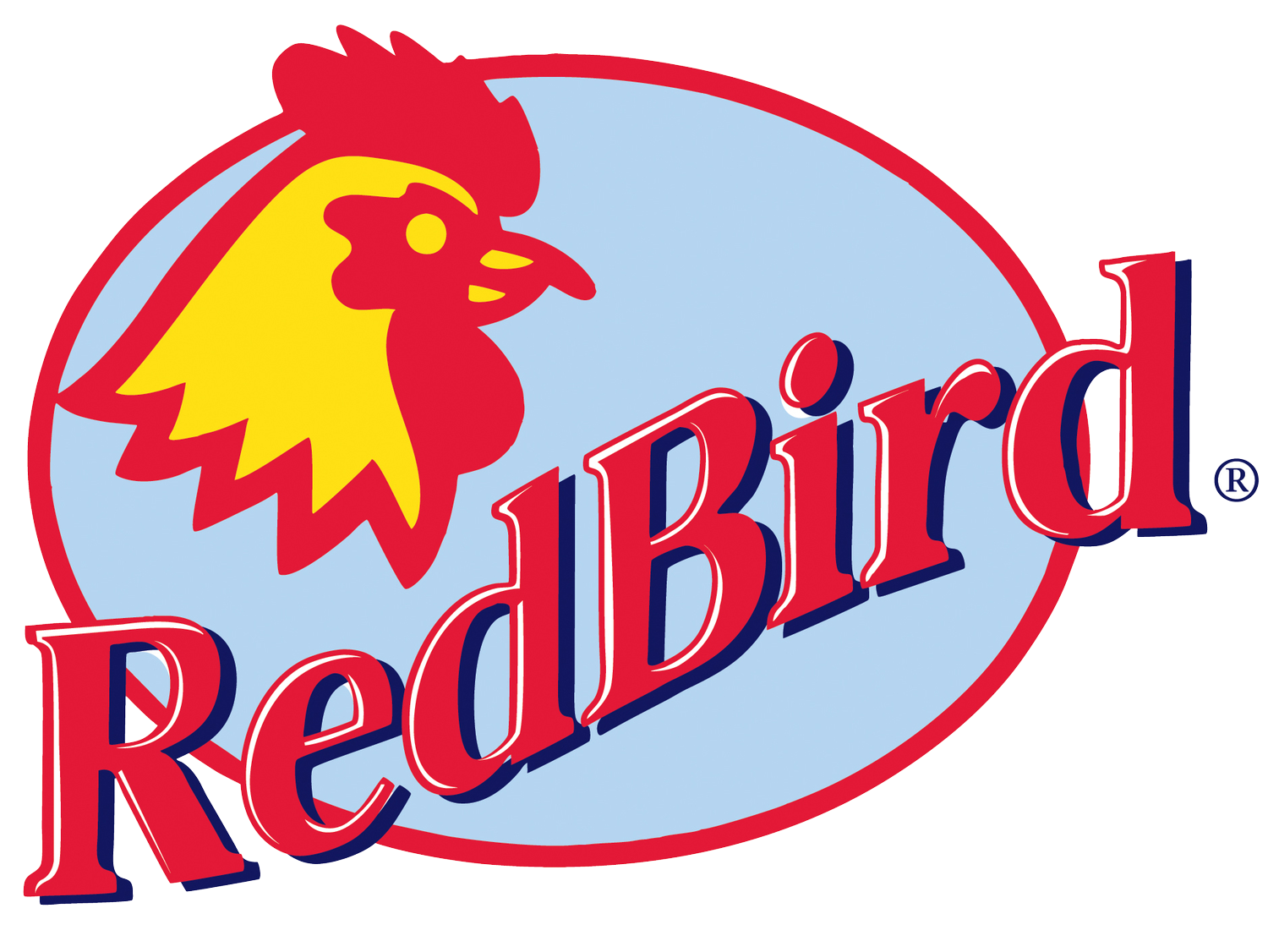
Healthy Chicken
RedBird Farms chickens are raised cage free, no antibiotics ever and without hormones or steroids. Our chickens are healthy, safe, and clean.
THE REDBIRD FARMS BREEDS
The Cobb Hubbard hybrid offers great flavor, consistency as well as a docile attitude. You might think that farmers pick this sweet breed only for its charming personality, but the taste can’t be beat!
The Ross breed has a product range that offers customers the solution for all requirements, first-class genetics and product performance. Whatever Ross product is used, customers can be assured that each one will add value to their operations, through their first-class health traits and all-round performance.
Raising RedBird Farms Chickens
RedBird Farms chicken flocks joyously roam spacious barns the size of ½ a football field with an unlimited access to feed and water. They enjoy ventilated housing and soft bedding of wood shavings and rice hulls. Chicken growers work to promote natural behaviors in controlled environments. The goal is to raise healthy, wholesome birds. Rest easy, poultry patrons, as factory farming techniques have flown the coop.
Vegetarian fed
Although RedBird Farms employees love to eat chicken, we prefer that our chickens eat grains. That’s not to say we think everybody should be a vegetarian: only our flocks! Our commitment to the clean food revolution starts at the source to keep chicken feed simple, pure and having no animal by products. The chicken’s vegetarian plate is a meal made up of corn and soy. Oddly enough, it tastes like granola!
Rested
We know that the original way of processing chickens is still the best way. While it takes more time, allowing the chickens to rest at least 4 hours after harvest allows the muscles time to relax and go through the rigor process. This creates that tender, juicy bite that RedBird Farms is known for!
Healthy chicks mean no medicine!
RedBird Farms live production focuses highly on new world techniques to defend against potentially harmful substances. Much advancement in poultry production has been based around feed additives and genetic improvements. RedBird Farms questioned this “progression” and agrees that feeding the world may be a challenge but adding potentially harmful substances to the foods we eat is the wrong approach.
Our goal in bringing you wholesome food is achieved by being proactive when it comes to animal health. RedBird Farms is committed to grow out standards that minimize harmful bacteria before they start. These standards include: thorough wash downs between flocks, complete traceability from laying hen to chick, constant monitoring of feed conversions and applying natural advancements to the animals life that benefit health. With these strict growing standards, you can rest assured that what goes into your body was grown with care and attention.
Raised without the use of antibiotics
Raised with No Antibiotics Ever (NAE) and fed no animal byproducts ever, these buzz words are being prominently listed on menus and storefront signage. It’s become such an important issue that politicians, schools, and news networks have all taken notice: we don’t want antibiotics in our food!
As consumers become hungry for clean, honest, safe, and healthy products; RedBird Farms has been happy to serve it. In a world full of junk, we are proud to offer this select, antibiotic free poultry. If you don’t see RedBird Farms at your local grocer, bug the butcher, for health’s sake!
*always read the label to see if a product is antibiotic free.
The difference between Antibiotic Free and No Antibiotics Ever:
Some programs claim to be Antibiotic Free (ABF) but they start the animal on antibiotics and will ween them off near the end. RedBird Farms is truly a NEVER EVER program from egg to plate.
Affect of antibiotics
This is centered on the assumption that the food chickens eat can harm your health. Although these antibiotics can surely get into your system, the greater threat is that many bacterias are growing stronger thanks to over exposure to antibiotics. RedBird Farms believes that a world with overused antibiotics is damaging to human health. We want our antibiotics to work when we need them!
Resistant bacteria and antibiotics generally found in the poultry world
Generally speaking, common bacteria that can resist antibiotics are E. Coli and Salmonella. Five antibiotics that are regularly used in the poultry industry are; bacitracin, virginamycin, flavomycin, sulfaquimoxaline and penicillin.
Join the clean revolution and be free of these potentially harmful substances. RedBird Farms highly recommends that you speak with your physician about the use of antibiotics in poultry and how they can affect you. The opinion of antibiotics in poultry by RedBird Farms, is strictly an opinion and should not be used when making a decision for your health.
No hormones or steroids
RedBird chickens are never given any hormones or steroids. Federal regulations prohibit the use of hormones.
Cage Free vs. Free Range Chickens
Although our chickens are allowed plenty of space and are raised Cage Free in large barns with the perfect temperature and humidity, they are not Certified Free Range.
A Free Range chicken must be “allowed access to the outside” per the USDA. The bird’s diet is not controlled and they will eat whatever is on the ground or whatever may fall to the ground including bird droppings (cause Bird Flu), insects, rocks, etc.

Kitchen Safety
RedBird Farms chicken is tasty and juicy, but it's still important that it's handled properly. In order to avoid cross contamination and keep your family safe, follow these kitchen safety guidelines.
Here at RedBird Farms, the kitchen is the most popular room at the office. All employees love to eat, and we’ve found that many of our best ideas and brain storming takes place in this room. Unfortunately, the kitchen is also the place where food safety can be the most at jeopardy.
We want to help your family stay well fed and healthy.
Cook chicken to 165° Fahrenheit (use a thermometer to measure internal temperature). A good oven temperature to roast a chicken is between 375-400*. Try to keep humidity out of your oven for better results!
Check out this video on how to keep your kitchen safe and clean!
Safety Tips for RedBird Farms.
Follow these basic rules when handling raw chicken!
REFRIGERATOR
Store fresh chicken between 30-36°F.*
.* This temperature will maximize shelf life and keep your chicken nice, juicy, and bacteria free.
The coolest place in a refrigerator is usually the bottom towards the back. Keep your chicken products in this cool place and they will stay fresh until the use/freeze by date on the label. Finally, we always recommend doing the "smell test" on ALL of your perishable goods...your nose knows best!
FREEZER
If you must freeze your RedBird Farms chicken, then be sure to remove the chicken from the tray pack and place into a plastic bag. The atmosphere in the tray packs has oxygen, so it will cause freezer burn.
GROCERY BAG ON COUNTER
Did you know that a large part of cross contamination occurs in reusable grocery bags? Make sure you clean your bags and also bag your raw meats separately from produce.
CUTTING BOARD
Use separate cutting boards for raw and cooked items. Also, be sure to have separate cutting boards for chicken, fish, meats and produce.
PLATES & UTENSILS
Keep separate plates for cooked and raw chicken as well as separate utensils for cooked and raw chicken. Also, keep knives sharp. You’re less likely to slip and cut yourself with sharp knives (rather than dull). Keep your chicken cuts clean and safe.
SINK
Wash your hands often and thoroughly. 1 in 6 Americans get food poisoning each year, and much of that illness can be avoided with proper hygiene. Wash your hands between handling different food items, after using the restroom, and regularly throughout the cooking process.

